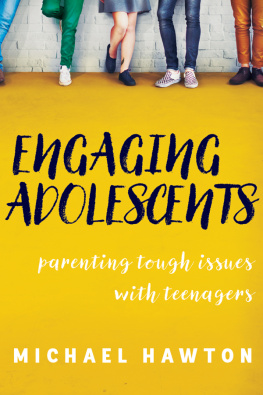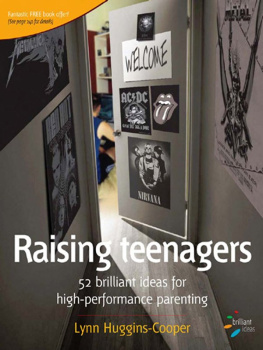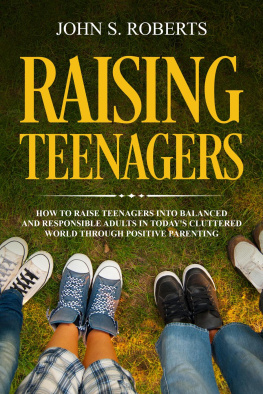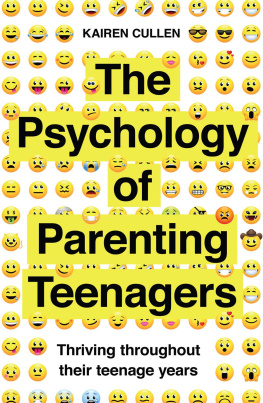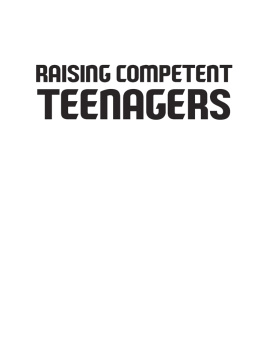ENGAGING
ADOLESCENTS
parenting tough issues with teenagers
M I C H A E L H A W T O N

Michael Hawton is a registered psychologist with 30 years of experience. He is a listed clinical expert with the NSW Childrens Court and an expert witness in the Family Court of Australia. A former teacher, Michael has spent much of his career working with parents and their children, and has been teaching family services workers and educational leaders in the area of behaviour management for over a decade. Michael has developed parent education programs that have been taught to over 100,000 parents and professionals since 2006. A father of two, Michael brings a clear and unambiguous method-based approach to ease the distress of parents experiencing difficulties with their teenagers behaviour.
One of the hardest parts of living with a teenager? Simply talking to them! Michael Hawton provides some practical and down-to-earth advice on how to defuse emotionally charged situations, have a meaningful conversation with a teen, and get something accomplished.
Dr Tom Phelan, author of Surviving Your Adolescents
This book provided me with real resources to implement and use at home. No airy fairy theories but real, practical things to say, do and live by.
Tina, mother of four
A very well thought-out program which provides step-by-step strategies to engage with adolescents and have difficult conversations to bring about positive change.
Emma, school counsellor and mother of three
This book gives you both the practical tools and the confidence to deal with typical teenage behaviour problems; you realize that youre not alone! Michael knows his stuff and all the material is supported by well-researched information.
Carol, mother of two
Schools should insist that all parents attend in fact, everyone needs to develop the skills taught in this course. Its a must for everyone who engages with young people.
Paris, teacher and mother of two
CONTENTS
PREFACE
For 30 years I have worked with families who are trying to organize things differently at home. I have found a lot of parents who lack confidence and thats not such a good thing. I tend to see parents who want the very best for their teenagers, but when a difficult matter comes along, they either feel they dont have the right to butt in or just hope that the problem will fix itself.
This lack of confidence isnt all that surprising. The context for raising young people has undergone some fairly big changes. In many ways, raising teenagers today is like the experiences of immigrant families when they first settle in an adopted country. These parents often report how their children know more about whats going on in the new country compared to them; they pick up the language better, they know how to navigate the scene and theyre critical of the way their parents do things. I suspect a fair few teenagers today see their parents as being out of touch in much the same way.
It might take a village to raise a child, but nowadays the idea of anyone other than a teenagers parent intervening to stop their son or daughter being rude or behaving badly in public is frowned upon. In fact, youre almost shunned for thinking this way. While someone watching a teenager going off at their parent might raise an eyebrow or two, its less likely that an adult who is not the parent will say, Hey, hang on there. What do you think you are doing? And, in some instances, even if the adult was to say something, they would be admonished by the very parent who is being abused. Clearly, the village idea needs some revisiting!
In my experience, the current strain felt by many parents with out there kids is most obvious when two ideals come into conflict (when a teenagers drive to push the boundaries clashes with their parents wishes to look out for their best interests). The two biggest issues facing parents today are how to sort out what difficult behaviour really is and how to manage it. These are the two issues which parents seek help for and the main reason I have written this book. As parents of teenagers, we all have another heart walking around out there and, if they look like theyre in danger, our own hearts skip a beat. Thats what comes with being attached I get that. However, loving your child doesnt mean you should tolerate just any sort of behaviour.
Its not hard to see why so many decisions about tackling difficult behaviour get put off to the never-never due to a lack of energy. I mean, how many of us want to wrangle with the spirited soul thats our teenage son or daughter after a hard days work? How many of us want to risk that kind of flare-up? Sometimes it seems easier just to ignore it and hope it solves itself in time. If you have felt this way, youre not alone.
That said, its a big mistake to hit the eject button too early with poorly behaved teenagers. Ive seen this too often in my own country town, where many young people were cut adrift by their parents before they were ready to cope with life. Although these young people were still living at home, their parents just didnt interfere with their lives. In fact, they lived like people who were living in a motel. I realize that trying to talk to teenagers is hard and can sap anyones energy. Its completely understandable that many parents just run out of puff. But there are solutions to these exhausting confrontations about behaviour and I will cover these in the book.
What Engaging Adolescents will give you
The main process I will show you is one for resolving a teenagers unacceptable behaviour. Its simple; only five steps. I will also show you how to be a more confident and effective parent. I know these methods work, because more than 24,000 parents have been taught them and they say they can do it. It all boils down to knowing how to manage a problem. Although the process I will show you is primarily used to manage the behaviour of teens, it can also be used for children age ten and upwards if they have the maturity to engage with the process.
In writing this guide, I want to re-boot a much-needed debate about parenting teenagers one where the new black is a reasonable expectation that you can positively affect a teenager for the better and see the results of your efforts. Instead of having hallway conversations (where everyone seemingly has an escape route) youll be able to sort through important issues to everyones satisfaction. Not only do I hope you will solve problems specific to your family, but youll be able to teach your teenager to become a better negotiator something theyre likely to be grateful for when they enter relationships, live with flatmates or deal with work colleagues.
You will also be more likely to handle a problem (and not put off dealing with it) if you know what to expect. By describing what might happen at each stage in a tough conversation about the problem and what steps you need to take to handle any reactive angst or uppityness you will go into conversations better prepared. Being better prepared means that you will be more confident. When a problem arises I will teach you how to have conversations where you will be able to calmly manage and resolve a problem at hand.
Ive certainly had lots to do with families across many years much more than many academics and like Malcolm Gladwell, the author of Blink, says, you get pretty good at doing your job after long enough. But I want to offer you some of my own personal experience as well, as I think you will gain comfort from knowing some of the mistakes I made when I was parenting two teenagers. There were times when I chastised myself during our childrens teenage years, with thoughts like: Youre a professional working in this area. Why did you just do that? The very thing you tell others

